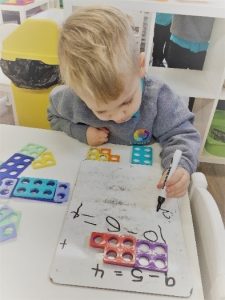Maths
‘Pure mathematics is, in its way, the poetry of logical ideas.’ Albert Einstein
“I like numbers. I like making big numbers and number stories with numicon.” Thomas, Reception.
“’We learn multiplication, division, addition and subtraction. They are important skills for the future and I feel challenged in my Maths lessons.’ Sam, Year 4
“When we need help there is always someone to help us.” – Maddie, Year 5
Intent:
We want all Tilstock pupils to:
• know more and remember more
• to develop number sense in the early years of school
• to enjoy and achieve within their learning so that they develop confidence in mathematics
• Have the best possible start for our pupils’ by closing the gap in knowledge through teaching pupils core facts, formulae and concepts which form the building blocks for the next stages of education
• to develop ‘automatic recall’ of key concepts to prevent their working memory from becoming overloaded
• to achieve the age-related expectations
Implementation:
Though our intent of pupils knowing more and remembering more, pupils’ mathematical knowledge is split into three types:
1. ‘I know that’ – facts and concepts.
2. ‘I know how’ – the sequence of steps.
3. ‘I know when’ – strategies to reason and problem solve.
Within each topic, pupils will use these three types, so that their knowledge of the relationships between mathematical concepts will develop over time. We will do this by ensuring that
• Pupils are not rushed through a topic, as some pupils may need more time than others.
• We adapt the curriculum to the needs of our learners.
• We have a spiral curriculum that revisits topics of work throughout the year.
• Teach in small steps, following a teaching sequence of concrete, pictorial, abstract.
• We follow the Rosenshine’s principles to ensure that we do not overload our pupil’s working memory
Impact:
Teachers will plan frequent, low-stakes assessments throughout the ‘learning journey’ to help pupils prepare for assessments that focus on what pupils have actually learnt.
• Using low stakes testing will not only increase knowledge retention, but also improve pupils confidence in maths.
• Using lessons to incorporate timed testing (The 99 club) can help pupils to develop fluency and give teachers the reassurance that ‘pupils are not reliant on derivation’ to calculate their answers.
• By planning regular assessments to ‘engineer proficiency’ and promote success, pupils can see tests as ‘moments to shine’ and even look forward to them.
To access the full document detailing our intent, implementation, impact and planning, please click here.
Milestones
We feel that in the current circumstances we need to ensure that all children are secure in the most important conceptual knowledge and understanding to enable them to progress into the next year group. The attached pathways show the Maths Milestones for each year group. This has been derived from the DfE publication: Mathematics guidance: key stages 1 and 2 Non-statutory guidance for the national curriculum in England June 2020.
The pathways identify the most important conceptual knowledge and understanding that pupils need as they progress from Year 1 to Year 6. These important concepts are referred to as ready-to-progress criteria and provide a coherent, linked framework to support pupils’ mastery of the primary mathematics curriculum.
The DfE recommends the use of these at the long-term planning stage, (to ensure that the most important elements that underpin the curriculum are covered at the right time, and to ensure that there is continuity and consistency for pupils as they progress from one year group to the next), and at the medium-term planning stage, (to inform decisions on how much teaching time to set aside for the different parts of the curriculum) therefore teaching time can be weighted towards the ready-to-progress criteria.
The 99 club parent information
Year 1/2 Autumn term medium term planning
Year 1/2 Spring term medium term planning
Year 1/2 Summer term medium term planning
Year 3/4 Autumn term medium term planning
Year 3/4 Spring term medium term planning
Year 3/4 Summer term medium term planning
Year 5/6 Autumn term medium term planning
Year 5/6 Spring term medium term planning
Year 5/6 Summer term medium term planning
Progression of knowledge and skills
Our calculation policies
Calculation Policy Division Key Stage 1
Calculation Policy Addition Key Stage 1
Calculation Policy Subtraction Key Stage 1
Calculation Policy Multiplication Key Stage 1
Calculation Policy Division Key Stage 2
Calculation Policy Addition Key Stage 2
Calculation Policy Subtraction Key Stage 2
Calculation Policy Multiplication Key Stage 2
Stories I can read at home that will help me
How can I help my child at home?
Maths


